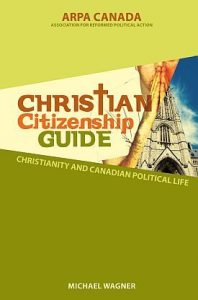Although many homeschooling teens and families have contributed enormously to the political process, no one can deny that the average person does not feel competent to do so. In fact, there is still debate about whether or not Christians should even be involved in politics. And among those who agree that it is a good idea, there is confusion both about how to think about politics in a Christian way and about how to be involved practically.
Our province requires a civics course in high school and our older children have met that requirement in various ways, including significant practical involvement. This time around, one of the resources we used was Michael Wagner’s Christian Citizenship Guide: Christianity and Canadian Political Life. Its goal is “…to help us better understand Canadian political life and the valuable role that we each can have in applying our faith to politics,” noting that the institutional separation of church and state does not mean that our religion should not affect our politics. On the contrary, the author points out that all political involvement is influenced by people’s most deeply held beliefs, whether they are religious or secular.
In four meaty chapters, Christian Citizenship Guide discusses
- Canada’s Christian past
- Our government’s structure and the effect of the Charter of Rights and Freedoms
- Human rights in history and today
- Practical hints for getting involved
Christian Citizenship Guide discusses and pulls together history, modern scholarship, and current events to explain how and why our political climate has changed in the last few decades. It defends the idea that Christians should be involved in politics and highlights current issues such as abortion and the erosion of freedom of speech. These are important matters for all of us. Other topics, such as euthanasia and freedom of the press, can be addressed from a similar mindset.
I found the discussion about the different kinds of human rights to be helpful. The third chapter also relates them to government and society involvement, which is an important aspect to consider. Of course, there is much more to say about the theory, history, and practice of human rights issues.
The final chapter reminds us how all of us must be involved—through prayer. It also discusses why further involvement is good, not bad, and gives wise and practical suggestions about how this can be done. Topics include how to do political work together with others, how to approach elected officials, and how to deal with the media. Aimed primarily at Reformed Christians but applicable to all Christians, it also mentions the Association for Reformed Political Action and the resources that organization has developed to help citizens be involved.
Obviously there are many different ways of thinking about Christian political action and this book represents only one general approach. However, because it is based on history and scholarship as well as a biblical foundation, its point of view can be helpful in rounding out other approaches.
Each chapter ends with a list of books for further reading as well as questions that can be used to gauge understanding of the material and to promote discussion. Even though some of these books are obviously advanced and beyond most high school students, the questions should be answerable by most teens, making this a helpful homeschool resource.
For our homeschool, I asked our teen to read the book, answer the questions, and discuss. We found it a valuable accompaniment to a secular high school civics text. We did not use it as an entire civics credit, but if a student wishes, Christian Citizenship Guide could form the basis for hands-on work in politics that would easily meet civics course requirements.
Although this book is geared specifically to Canadians, parts of it would be helpful to people in all countries. The sections that would most benefit non-Canadians include the first part of the chapter on human rights and the entire final chapter.
Christian Citizenship Guide is available as a free PDF from the publisher. I have not been able to find a source for a paperback like the one we have, but if that changes I will let you know.
—
If you enjoyed this review, you might want to connect with me on GoodReads where I eventually share what I read or friend me on Facebook where I occasionally show up.
Disclosure: We used a paperback copy of the book that we have had for years; we are not compensated for presenting our honest opinions. (Currently it is available as a free downloadable PDF as specified above.)
This post may be linked to Booknificent Thursdays, 52 Books in 52 Weeks Challenge, Literacy Musings Monday, and The Book Nook as well as to Inspire Me Monday, Homemaking Linkup, Friendship Friday.

